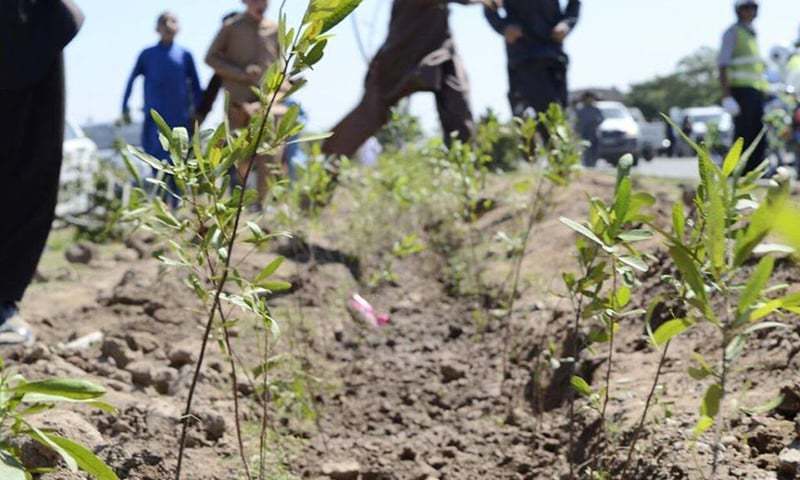ISLAMABAD: A target of planting around 200 million saplings across the country has been set for the country’s largest ongoing monsoon tree plantation season 2020, said Adviser to the Prime Minister on Climate Change Malik Amin Aslam.
“Maximum efforts will be made to achieve the target, and if possible exceed it by a huge margin during the monsoon tree plantation season that will continue till September 30,” Mr Aslam said while talking to the media on Sunday.
He told the media that the target of 200m saplings was approved after consultations with the provincial forest departments, which shared their approved targets of tree plantation during the ongoing three-month monsoon plantation season, which continues from July to September.
Prime Minister Imran Khan inaugurated the country’s largest country-wide ‘Monsoon Tree Plantation and Protection Campaign 2020’ by planting a sapling in Kahuta on July 17. He pledged to utilise all possible resources and capacities to enhance the country’s forest cover and fight environmental degradation.
Aslam says target was approved in consultation with provincial forest departments
While addressing a ceremony, Mr Khan had lauded the passion of the youth for their participation in the tree plantation campaign across the country, saying, “Youth and students are the future of Pakistan.”
While sharing details of the monsoon tree plantation targets, Mr Aslam said that as many as 80m seedlings would be planted in Khyber Pakhtunkhwa province during the ongoing monsoon season followed by 60m plants in Sindh, 37m plants in Punjab, 14m in Azad Jammu and Kashmir, 2.050m plants in Gilgit-Baltistan, 0.602m plants in Balochistan. The remaining plants will be planted by different civil society organizations, including International Union of Conservation for Nature — Pakistan and World Wide Fund for Nature — Pakistan.
He said that tree plantation targets are set twice a year for spring season (February-March) and monsoon season (June-September), which are months of good rains and which adequately soak the soils vital to healthy growth of tree saplings.
“The monsoon season [June-September] is an opportunity for forests’ growth in the country. The year’s longest four-month wet season is a source of trillions of litters of rainwater needed for the seedlings to grow fast and hold their grip in soil strongly,” Mr Asla said.
He said that tree plantation is vital for conserving nutrient-rich soil through regeneration of forests across the country.
“Being a proven method to maintain the fertility of the ground by protecting the soil from erosion and nutrient loss, the soil conservation is important. It provides food, filters air and water and helps to decompose biological waste into nutrients for new plant life,” the prime minister’s aide argued.
Mr Aslam said that the Covid-19 pandemic has brought new challenges for the country in terms of job losses and slow-down in economic activities.
However, through tree plantation activities new green jobs are being created and youth are being engaged in such healthy activities to boost their contribution to the country’s fight against climate change and environmental degradation.
He further said that tree plantation activities during the ongoing three-month monsoon season will lead to generation of estimated 34, 470 green jobs for daily wagers, who have been rendered unemployed because of the pandemic.
Conveying the prime minister’s enhanced interest in protection of forests and wildlife resources in the country, he said the number of such exclusive zones, where the plants and trees could grow and wildlife flourish, would be significantly enhanced in the coming days under the present government’s ambition Ten Billion Tree Tsunami Programme being implemented across the country with full support of the provincial governments, educational institutions, INGOs, NGOs and other civil society organisations.
The adviser also said, “Over the past two years of the present government, 300m trees have been planted across the country, while new nurseries are working at a higher pace to hike this number to one billion by June next year.”
“To achieve this goal of the 10 Billion Tree Tsunami Programme is particularly important. Forests are the best way to cope with various deleterious socio-economic, environmental and health-related fallouts of global warming-triggered climate crisis, particularly floods, droughts, heat waves, desertification, wind erosion, storm-rains and heavy winds, cyclones, sea intrusion, glacial melt, erratic and torrential rain being experienced in the country in a more frequent and intensified manner.”
He said that the role of the country’s youth and teachers is critical to achieve Prime Minister Imran Khan’s vision of ‘Clean Green Pakistan’.
Published in Dawn, July 20th, 2020













































